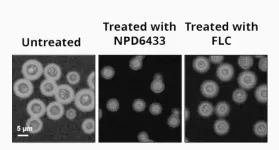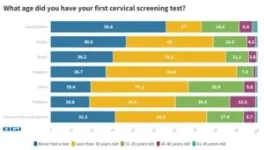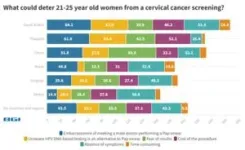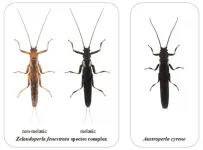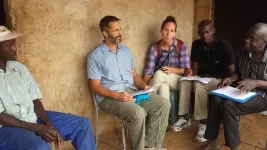(Press-News.org) Researchers at the RIKEN Center for Sustainable Research Science (CSRS) and the University of Toronto have discovered a new way to attack fungal infections. The key is to block fungi from being able to make fatty acids, the major component of fats. Resistance to anti-fungal drugs is increasing and this new approach will be particularly useful because it works in a new way and affects a broad range of fungal species. The study was published in the scientific journal Cell Chemical Biology.
Most of us are familiar with athlete’s foot, a relatively harmless health issue that can be solved by a trip to the drug store. But other fungal infections are more serious, and the Candida, Cryptococcus, and Aspergillus types of fungus are responsible for millions of deaths every year. Like bacterial resistance to antibiotics, fungal resistance to medications is also growing worldwide, and the death toll will likely rise in the near future unless something is done now.
Currently there are only three major classes of anti-fungal medications, and all of them work by destroying the barrier that surrounds fungal cells. Paradoxically, even though they all attack the barrier, current treatments are actually very specific, meaning that what kills one species of fungus might not kill another.
The group of researchers wanted to find another way to combat harmful fungi, one that would be useful against numerous species. Their approach was to first screen the structurally-diverse RIKEN natural product depository (NPDepo) against four pathogenic yeasts—three Candida and one Cryptococcus species—which have been identified as critical human pathogens by the World Health Organization. They were looking for something that would affect all four species, which would indicate that it might be effective against a broad range of fungi.
The screening identified several compounds that reduced fungal growth by at least 50% in each of the four species, and after eliminating ones which were already known, the researchers were left with three new possibilities. Among these three, the one least toxic to human cells also reduced growth of Aspergillus fumigatus, an extremely common fungal mold that is deadly to immuno-compromised individuals. The name given to this compound in the RIKEN NPDepo is NPD6433. The next step was to find out what it does.
For almost 1000 different genes, the researchers looked at how much NPD6433 suppressed growth in yeast when the yeast was missing one copy of the gene. They found that reduction in only one gene, fatty acid synthase, made yeast more susceptible to NPD6433. This result meant that NPD6433 likely works by inhibiting fatty acid synthase and thus prevents fatty acids from being made inside fungal cells. Further experiments showed that NPD6433 and cerulenin, another fatty acid synthase inhibitor, were able to kill numerous yeast species in culture.
The final experiment tested how well NPD6433 treatment worked in a live laboratory model organism—the worm Caenorhabditis elegans—which was infected with a pathogenic yeast that can cause systemic infection in humans after invading through the intestines. C. elegans was chosen because it has an intestinal tract that works like ours. Tests showed that treating infected worms with NPD6433 reduced fatalities by about 50%. Importantly, this was true in worms infected with yeast that were resistant to a standard anti-fungal medication.
“Drug-resistant fungi are a growing problem, and leads for the development of new drugs offer hope against these evolving pathogens,” says Yoko Yashiroda, lead RIKEN CSRS author of the study. “Our research indicates that targeting fatty acid synthesis is a promising alternative therapeutic strategy for fungal infections, and one which might not require tailor-made solutions for individual species.”
END
Deadly fungus beaten with new type of treatment
2023-08-01
ELSE PRESS RELEASES FROM THIS DATE:
62 percent of young Thai women put off by pap smears | BGI Insight
2023-08-01
Only 28.5% of Thai women are diagnosed at stage I of cervical cancer when survival rates are highest, according to a study published by the Mahidol University. To further motivate action to combat cervical cancer, BGI Genomics released its State of Cervical Cancer Awareness Report in Thailand. This report assesses the level of knowledge, attitudes, and practices related to cervical cancer screening and HPV vaccination to highlight the associated barriers and opportunities. 1,878 female respondents from six countries and ...
When cheating pays – survival strategy of insect uncovered
2023-08-01
Researchers have revealed the unique ‘cheating’ strategy a New Zealand insect has developed to avoid being eaten – mimicking a highly toxic species.
In nature, poisonous species typically advertise their toxicity, often by producing high contrast colours such as black, white and yellow, like wasps and bees.
Along similar lines, New Zealand’s cyanide-producing stonefly, Austroperla cyrene, produces strong ‘warning’ colours of black, white and yellow, to highlight its threat to potential predators.
In a new study published in Molecular Ecology, University of Otago Department of Zoology researchers reveal that an ...
Nuisance vegetation removal in Senegalese waterways reduces the overall prevalence of parasitic infections and increases local food production
2023-08-01
It’s an elegant solution: Remove the habitat of a parasite-carrying aquatic snail and reduce the level of infection in the local community; all while generating more feed and compost for local farmers.
A collaboration of scientists from the United States and Senegal focused on doing just that by removing overgrown aquatic vegetation from areas upstream of the Diama Dam in northeastern Senegal. In doing so, they generated positive impacts to the local communities’ health and economies.
“It is rare and gratifying when we can find a potential win-win solution to both human health ...
The Lancet: New study reveals global anemia cases remain persistently high among women and children. Anemia rates decline for men.
2023-08-01
**Embargo: 23.30 [UK time] / 6.30pm [ET] Monday, July 31, 2023**
Peer-reviewed
The Lancet: New study reveals global anemia cases remain ...
Genome data rewrite the story of oat domestication in China
2023-08-01
Oat is among the top ten cereal crop species in terms of global production. It can adapt to different climates, and farmers can grow it successfully even in harsh environments where other crops such as rice and corn fail. However, not all oat plants are the same. Based on their grains, two major oak varieties can easily be distinguished: hulled, grains that are covered in a non-edible husk, and naked, grains that have a soft outer casing that easily separates from the edible grain during threshing. To gain information on the origins of these different varieties, researchers in China have sequenced the ...
Holding Trump accountable will not threaten American democracy
2023-08-01
With a Fulton County indictment of former President Donald Trump possible at any time, law enforcement in Atlanta is bracing for potential violence, with orange barricades restricting access to the entrance of the county courthouse.
With the anticipation of each new indictment has come threats of violence, decrease in trust in American justice and calls for retribution against the government. Just how concerned should Americans be that we may face another January 6th-type incident?
New data from the Polarization ...
Modifications to amino acids in sperm could be behind infertility
2023-07-31
Sperm play a critical role in the creation of new life, delivering essentially half of the genetic material required.
The success of this process relies on the generation of a developmentally competent sperm cell, which is often determined by shape. Indeed, during in vitro fertilization, the “best-looking” sperm is selected to fertilize an egg.
However, how this optimal shape translates to proper sperm function is difficult to assess because of many confounding factors.
Researchers at the University of Michigan are now delving into the molecular-level details of sperm formation, with a particular focus on how abnormalities in ...
Harnessing the power of light: Advancements in photonic memory for faster optical computing
2023-07-31
Technological advancements like autonomous driving and computer vision are driving a surge in demand for computational power. Optical computing, with its high throughput, energy efficiency, and low latency, has garnered considerable attention from academia and industry. However, current optical computing chips face limitations in power consumption and size, which hinders the scalability of optical computing networks.
Thanks to the rise of nonvolatile integrated photonics, optical computing devices can achieve in-memory computing while operating with zero static power consumption. Phase-change materials (PCMs) have emerged as promising candidates for achieving photonic memory and nonvolatile ...
Study raises possibility of immunotherapy treatment for ALS
2023-07-31
New research reveals a type of monoclonal antibody already tested in certain forms of cancer may be a promising treatment in stopping the progression of amyotrophic lateral sclerosis, or ALS, a fatal neurodegenerative disease.
The study, led by scientists at Oregon Health & Science University, published today in the Proceedings of the National Academy of Sciences.
The study, involving a mouse model and confirmed in the tissue of human brains affected by ALS and donated after death, revealed for the first time that modulating immune cells can slow the progression of the disease. Previous research suggested a role for immune cells in ALS, but researchers this time used a high-throughput ...
Multi-level international study explores anxiety, concerns of families with a child with a neurodevelopmental condition during the COVID-19 pandemic
2023-07-31
A peer-reviewed study published in the Journal of Global Health analyzed data from more than 6,600 families with a child with a neurodevelopmental condition (NDC)—autism, attention-deficit/hyperactivity disorder, developmental language disorder, Down syndrome, Williams syndrome, and intellectual disability—from 70 countries, including the United States.
The study was led by Andrea Samson, associate professor of psychology at UniDistance Suisse and University of Fribourg, Switzerland, and Jo Van Herwegen, professor in developmental psychology and education at University College London’s ...
